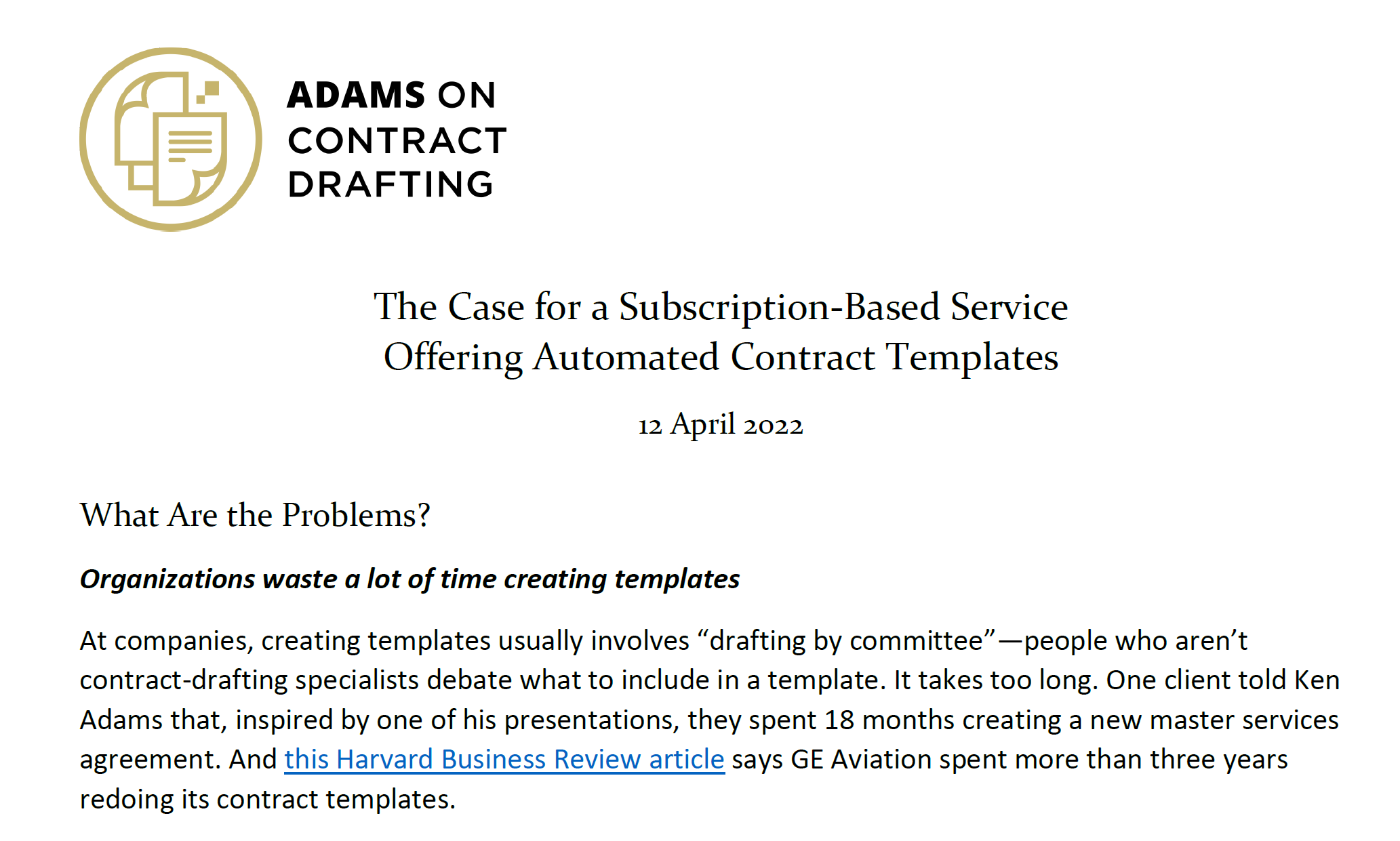The only way to escape contract dysfunction is to provide those who work with contracts an alternative to the copy-and-paste machine. The simplest and most effective alternative would be a subscription-based service offering automated contract templates.
For as long as I’ve been researching contract language, I’ve wanted to create such a service. That’s no accident: I’ve always had in mind that the former would facilitate the latter.
But I’ve never found anyone willing to contribute resources to such an initiative. Heck, it’s rare that I encounter anyone in a position to make a difference who expresses interest in the idea. That has nothing to do with its merits. Instead, it’s a reflection of the inertia that keeps us stuck in dysfunction. After all, given that I’m the only person who felt compelled to compile comprehensive and rigorous guidelines for the building blocks of contract language, it shouldn’t come as a surprise that I’m the only person agitating to put those guidelines to use to make better contracts more accessible.
In recent months I’ve beaten the bushes some more, but that has yet to result in meaningful conversations. If I don’t get anywhere, I’ll assume that instead of being a blueprint for scaling up clear and concise contract prose so it’s available to all, A Manual of Style for Contract Drafting will just be for those who have the time, inclination, and semantic acuity to make use of it. That’s nothing to sneeze at, but I’ve hoped for more, so I’m not yet willing to take ho-hum for an answer.
Today someone asked me to summarize my case for what I want to do, so I wrote a breezy two-plus pages long. Below is a screenshot of part of the first page. If you want to read the whole thing, you can download the PDF by clicking here.


Ken, I have thought about this idea (an automated contract templates subscription service) many times over the years. My background is 35 years as a lawyer, much of my time spent drafting estate planning documents and business contracts, with the last 25 of those years using HotDocs to automate business, estate planning, and probate documents for my firm’s use.
It seems to me that two of the biggest obstacles to the success of an automated contract template service are (1) hourly billing, which disincentivizes lawyers to find a more efficient way to draft contracts and (2) each lawyer’s love for his or her own forms (or the form set used by his or her practice group).
To get past those obstacles, a proponent of an automated contracts template service must articulate a value proposition that justifies the time required to become familiar with and trust a new set of forms and the cost of the service. WealthCounsel has succeeded in doing this for estate planning forms, which use a modern style of drafting. (There are probably others.) How they did this would be worth studying.
One suggestion I have is that this type of subscription service should include not only automated contract templates but also a clause library, which would allow a contact drafter to import well-drafted clauses into the drafter’s own contracts.
Is there a possibility of getting Thomson Reuters or Lexis to support such a service? They could provide the man/womanpower to keep the templates updated as the law changes.
Hi Mark. Because of the impediments you mention, plus some others, law firms are likely to be laggards when it comes to embracing this sort of initiative. That’s why companies are the more likely market. But I expect that even some law firms would find compelling what this sort of initiative has to offer. It’s a massive market; you need only modest buy-in to be viable.
Yes, a clause library would make sense.
Years ago I spoke with all the obvious information companies. No interest. I’m not surprised: they’re not where the action is these days.
Westlaw/PLC bought Koncision, but for the short time I was digging into the company, there was zero interest in changing the style of the templates or building on the tools. (That was a while ago, but I don’t see it being pitched these days either. – Well, here’s their list: https://content.next.westlaw.com/practical-law/document/I1a88c6cf6cd311e79bef99c0ee06c731/Practical-Law-Automated-Documents?contextData=%28sc.Default%29&transitionType=Default&firstPage=true&viewType=FullText